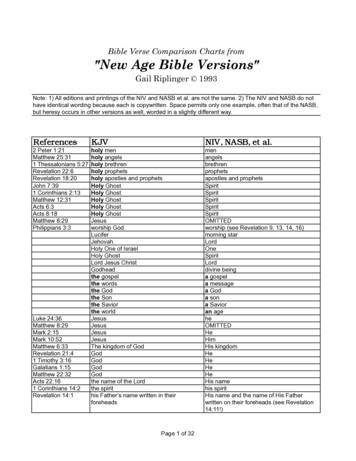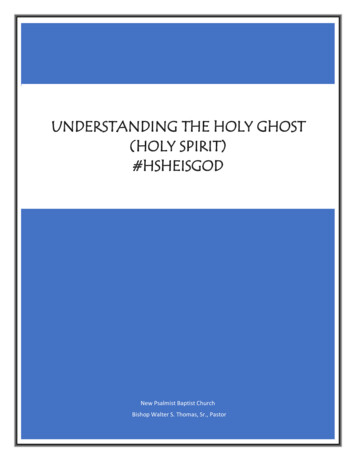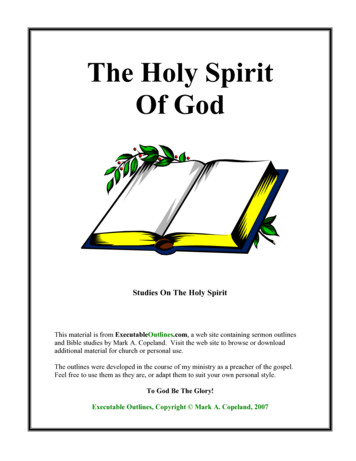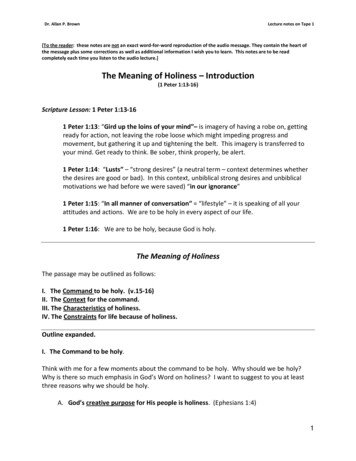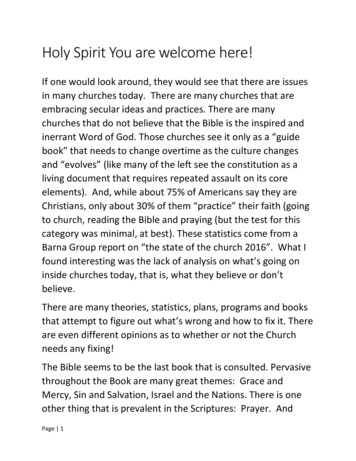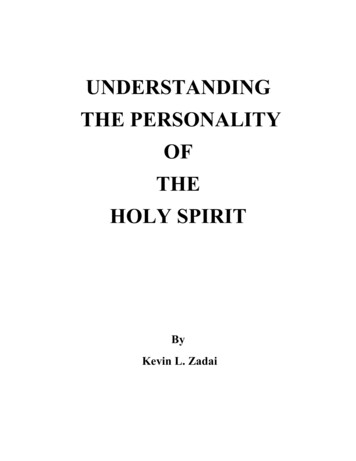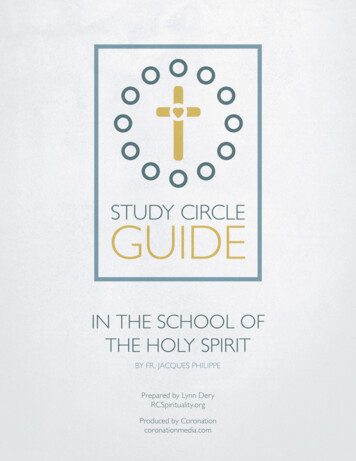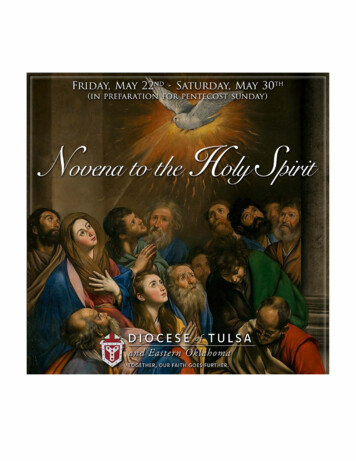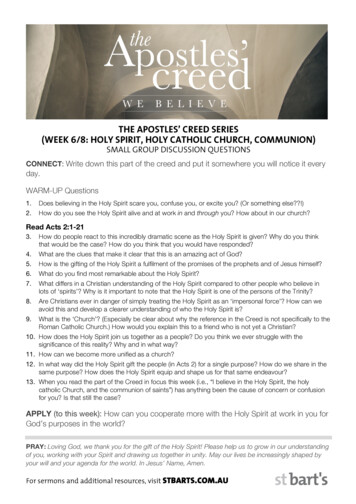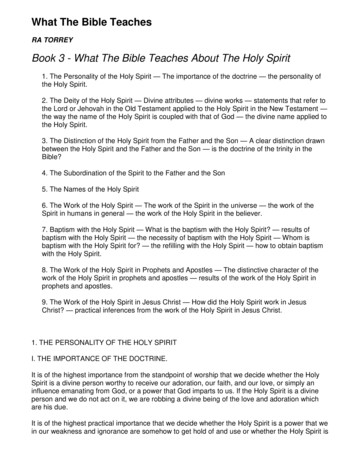
Transcription
The Work of the Holy SpiritAuthor(s):Kuyper, Abraham (1837-1920)Publisher:Grand Rapids, MI: Christian Classics Ethereal LibraryDescription:Subjects:"Even though we honor the Father and believe on the Son,how little do we live in the Holy Spirit!" Throughout the historyof the Christian tradition, the Holy Spirit has been one of themost elusive aspects of the faith. During Kuyper's time, verylittle attention had been given to the person and works of theHoly Spirit. Kuyper recognized this void, and as the editor ofthe weekly religious publication entitled The Herald, Kuyperdedicated approximately one hundred short entries to theworks of the Holy Spirit. The Work of the Holy Spirit is acompilation of these entries organized into three Volumes.Volume One addresses the influence of the Holy Spirit in theChurch as a whole, while Volumes Two and Three focus onthe works of the Holy Spirit in the individual. Kuyper's entriesprovide a comprehensive study of the Holy Spirit, exploringin detail how the Holy Spirit sanctifies both the Church andits members.Emmalon DavisCCEL Staff WriterChristian DenominationsProtestantismPost-ReformationOther Protestant denominationsReformed or Calvinistic Churchesi
ContentsTitle Page1Preface of the Author2Explanatory notes to the American edition6Introductory Note14Preface of the Author27Volume One: The Work of the Holy Spirit in the Church as a Whole28First Chapter. Introduction29I. Careful Treatment Required30II. Two Standpoints.34III. The indwelling and outgoing works of God.38IV. The work of the Holy Spirit distinguished.42Second Chapter. The Creation45V. The principle of life in the creature46VI. The Host of Heaven and of Earth.50VII. The Creaturely Man54VIII. Gifts and Talents58Third chapter. Re-Creation.62IX. Creation and Re-Creation63X. Organic and Individual67XI. The Church Before and After Christ71Fourth Chapter. The Holy Scripture of the Old Testament74XII. The Holy Scripture75XIII. The Scripture a Necessity78XIV. The Revelation to Which the Scripture of the Old Testament Owes ItsExistence82XV. The Revelation of the Old Testament in Writing86ii
XVI. InspirationFifth Chapter. The Incarnation of the Word.8993XVII. Like One of Us94XVIII. Guiltless and Without Sin.98XIX. The Holy Spirit in the Mystery of the IncarnationSixth Chapter. The Mediator.101105XX. The Holy Spirit in the Mediator106XXI. Not Like unto Us109XXII. The Holy Spirit in the Passion of Christ113XXIII. The Holy Spirit in the Glorified Christ117Seventh Chapter. The Outpouring of the Holy Spirit121XXIV. The Outpouring of the Holy Spirit122XXV. The Holy Spirit in the New Testament Other than in the Old126XXVI. Israel and the Nations131XXVII. The Signs of Pentecost135XXVIII. The Miracle of Tongues139Eighth Chapter. The Apostolate144XXIX. The Apostolate145XXX. The Apostolic Scriptures150XXXI. Apostolic Inspiration154XXXII. Apostles To-Day?158Ninth Chapter. The Holy Scriptures in the New Testament162XXXIII. The Holy Scriptures in the New Testament163XXXIV. The Need of the New Testament Scripture167XXXV. The Character of the New Testament Scripture171Tenth Chapter. The Church of Christ175XXXVI. The Church of Christ176XXXVII. Spiritual Gifts180XXXVIII. The Ministry of the Word184XXXIX. The Government of the Church189Volume Two. The Work of the Holy Spirit in the IndividualFirst Chapter. Introduction193194iii
I. The Man to be Wrought upon.195II. The Work of Grace a Unit.198III. Analysis Necessary202IV. Image and Likeness206V. Original Righteousness209VI. Rome, Socinus, Arminius, Calvin213VII. The Neo-Kohlbruggians217VIII. After the Scripture223IX. The Image of God in Man227X. Adam Not Innocent, but Holy231Second Chapter. The Sinner to be Wrought Upon235XI. Sin Not Material236XII. Sin Not a Mere Negation241XIII. Sin a Power in Reversed Action245XIV. Our Guilt249XV. Our Unrighteousness253XVI. Our Death.257Third Chapter. Preparatory Grace261XVII. What Is It?262XVIII. What It Is Not.266Fourth Chapter. Regeneration270XIX. Old and New Terminology271XX. Its Course275XXI. Regeneration the Work of God.279XXII. The Work of Regeneration.284XXIII. Regeneration and Faith.288XXIV. Implanting in Christ293XXV. Not a Divine-Human Nature297XXVI. The Mystical Union with Immanuel302Fifth Chapter. Calling and Repentance306XXVII. The Calling of the Regenerate307XXVIII. The Coming of the Called311iv
XXIX. Conversion of All That ComeSixth Chapter. Justification316320XXX. Justification321XXXI. Our Status326XXXII. Justification from Eternity.331XXXIII. Certainty of Our Justification.335Seventh Chapter. Faith340XXXIV. Faith in General.341XXXV. Faith and Knowledge345XXXVI. Brakel and Comrie.350XXXVII. Faith and the Sacred Scriptures.358XXXVIII. The Faculty of Faith362XXXIX. Defective Learning366XL. Faith in the Saved Sinner Alone372XLI. Testimonies376Volume Three. The Work of the Holy Spirit in the Individual (Continued)First Chapter. Sanctification385386I. Sanctification387II. Sanctification Is a Mystery390III. Sanctification and Justification394IV. Sanctification and Justification (Continued)397V. Holy Raiment of One's Own Weaving400VI. Christ Our Sanctification404VII. Application of Sanctification408VIII. Sanctification in Fellowship with Immanuel411IX. Implanted Dispositions.414X. Perfect in Parts, Imperfect in Degrees.417XI. The Pietist and the Perfectionist.421XII. The Old Man and the New.426XIII. The Work of God in Our Work430XIV. The Person Sanctified434XV. Good Works438v
XVI. Self-DenialSecond Chapter. LOVE443448XVIII. Love in the Triune Being of God.452XIX. The Manifestation of Holy Love455XX. God the Holy Spirit the Love which Dwells in the Heart.459XXI.The Love of the Holy Spirit in Us.463XXII. Love and the Comforter.467XXIII. The Greatest of These is Love.472XXIV. Love in the Blessed Ones.478XXV. The Communion of Saints.482XXVI. The Communion of Goods.487XXVII. The Communion of Gifts.492XXVIII. The Suffering of Love.496XXIX. Love in the Old Covenant.500XXX. Organically One.504XXXI. The Hardening Operation of Love508XXXII. The Love Which Withers512XXXIII. The Hardening in the Sacred Scripture.516XXXIV. Temporary Hardening520XXXV. The Hardening of Nations524XXXVI. The Apostolic Love528XXXVII. The Sin Against the Holy Ghost532XXXVIII. Christ or Satan536Third Chapter. Prayer540XXXIX. The Essence of Prayer541XL. Prayer and the Consciousness545XLI. Prayer and the Unconverted550XLII. The Praer of the Regenerated556XLIII. Prayer for and with Each Other561Subject Index566Indexes588Index of Scripture References589vi
Index of Pages of the Print Edition593vii
This PDF file is from the Christian Classics Ethereal Library, www.ccel.org. The mission ofthe CCEL is to make classic Christian books available to the world. This book is available in PDF, HTML, ePub, Kindle, and other formats. Seehttp://www.ccel.org/ccel/kuyper/holy spirit.html. Discuss this book online at http://www.ccel.org/node/2972.The CCEL makes CDs of classic Christian literature available around the world through theWeb and through CDs. We have distributed thousands of such CDs free in developingcountries. If you are in a developing country and would like to receive a free CD, pleasesend a request by email to cd-request@ccel.org.The Christian Classics Ethereal Library is a self supporting non-profit organization atCalvin College. If you wish to give of your time or money to support the CCEL, please visithttp://www.ccel.org/give.This PDF file is copyrighted by the Christian Classics Ethereal Library. It may be freelycopied for non-commercial purposes as long as it is not modified. All other rights are reserved. Written permission is required for commercial use.viii
Title PageTHE WORK OFiTHE HOLY SPIRITBYABRAHAM KUYPER, D.D., LL.DPROFESSOR OF SYSTEMATIC THEOLOGY IN THE UNIVERSITY OF AMSTERDAM.TRANSLATED FROM THE DUTCH WITH EXPLANATORY NOTES BYREVEREND HENRI DE VRIESWITH AN INTRODUCTION BYPROFESSOR BENJAMIN B. WARFIELD, D.D., LL.D.OF PRINCETON THEOLOGICAL SEMINARYWM. B. EERDMANS PUBLISHING CO.GRAND RAPIDS, MICH.1946COPYRIGHT, 1900 BY FUNK & WAGNALLS COMPANYii[Registered at Stationers’ Hall, London.]Printed in the United States of America.iiiviivixviiivii1
Preface of the AuthorPREFACE OF THE AUTHOR.Special treatises on the Person of the Holy Spirit are comparatively few, and systematictreatment of His Work is still more uncommon. In dogmatics, it is true, this subject is introduced, developed, and explained, but special treatment is exceptional.As much as there is written on Christ, so little is there written on the Holy Spirit. Thework of John Owen on this subject is most widely known and still unsurpassed. In fact, JohnOwen wrote three works on the Holy Spirit; published in 1674, 1682, and 1693. He wasnaturally a prolific writer and theologian. Born in 1616, he died at the good old age of seventyfive years, in 1691. From 1642, when he published his first book, he continued writing booksuntil his death.In 1826 Richard Baynes reissued the works of John Owen, D.D., edited by ThomasRussell, A.M., with memoirs of his life and writings (twenty-one volumes). This edition isstill in the market, and offers a treasury of sound and thorough theology.Besides Owen’s works I mention the following:David Rungius, “Proof of the Eternity and Eternal Godhead of the Holy Spirit,” Wittenberg, 1599.Seb. Nieman, “On the Holy Spirit,” Jena, 1655.Joannes Ernest Gerhard, “On the Person of the Holy Spirit,” Jena, 1660.Theod. Hackspann, “Dissertation on the Holy Spirit,” Jena, 1655.J. G. Dorsche, “On the Person of the Holy Spirit,” Köningsberg, 1690.Fr. Deutsch, “On the Personality of the Holy Spirit,” Leipsic, 1711.Gottfr. Olearius (John F. Burgius), “On the Adoration and Worship of the Holy Spirit,”Jena, 1727.J. F. Buddeuss, “On the Godhead of the Holy Spirit,” Jena, 1727.J. C. Pfeiffer, “On the Godhead of the Holy Spirit,” Jena, 1740.G. F. Gude, “On the Martyrs as Witnesses for the Godhead or the Holy Spirit,” Leipsic,1741.J. C. Danhauer, “On the Procession of the Holy Spirit from the Father and the Son,”Strasburg, 1663. J. Senstius, Rostock, 1718, and J. A. Butstett, Wolfenbüttel, 1749. JohnSchmid, John Meisner, P. Havercorn, G. Wegner, and C. M. Pfaff.The Work of the Holy Spirit has been discussed separately by the following: Anton,“The Holy Spirit Indispensable.” Carsov, “On the Holy Spirit in Conviction.” Wensdorf,“On the Holy Spirit as a Teacher.” Boerner, “The Anointing of the Holy Spirit.” Neuman,“The Anointing which Teaches All Things.” Fries, “The Office of the Holy Spirit in General.”Weiss, “The Holy Spirit Bringing into Remembrance.” Foertsch, “On the Holy Spirit’sLeading of the Children of God.” Hoepfner, “On the Intercession of the Holy Spirit.”Beltheim, Arnold, Gunther, Wendler, and Dummerick, “On the Groaning of the Holy2x
Preface of the AuthorSpirit.” Meen, “On the Adoration of the Holy Spirit.” Henning and Crusius, “On the Earnestof the Holy Spirit.”The following Dutch theologians have written on the same subject: Gysbrecht Voetiusin his “Select-Disput,” I, p. 466. Sam, Maresius, “Theological Treatise on the Personalityand Godhead of the Holy Spirit,” in his “Sylloge-Disput,” I, p. 364. Jac. Fruytier, “The AncientDoctrine Concerning God the Holy Spirit, True, Proven, and Divine”; exposition of Johnxv. 26, 27. Camp, Vitringa, Jr., “Duæ Disputationes Academicæ de Notione Spiritus Sancti,”in his Opuscula.Works on the same subject during the present century can scarcely be compared withthe studies of John Owen. We notice the following: Herder, “Vom Paraclet.” Kachel, “Vonder Lästerung wider den Heiligen Geist,” Nürnberg, 1875. E. Guers, “Le Saint-Esprit, Étudedoctrinale et pratique sur Sa Personne et Son Œuvre,” Toulouse, 1865. A. J. Gordon, “Dispensation of the Spirit.”This meager bibliography shows what scant systematic treatment is accorded to thePerson of the Holy Spirit. Studies of the Work of the Holy Spirit are still more scanty. It istrue there are several dissertations on separate parts of this Work, but it has never beentreated in its organic unity. Not even by Guers, who acknowledges that his little book is notentitled to a place among dogmatics.In fact, Owen is still unsurpassed and is therefore much sought after by good theologians,both lay and clerical. And yet Owen’s masterpiece does not seem to make a closer study ofthis subject superfluous. Although invincible as a champion against the Arminians andSemi-Arminians of the latter part of the seventeenth century, his armor is too light to meetthe doctrinal errors of the present time. For this reason the author has undertaken to offerthe thinking Christian public an exposition of the second part of this great subject, in a formadapted to the claims of the age and the errors of the day. He has not treated the first part,the Person of the Holy Spirit. This is not a subject for controversy. The Godhead of the HolySpirit is indeed being confessed or denied, but the principles of which confession or denialis the necessary result are so divergent that a discussion between confessor and denier isimpossible. If they ever enter the arena, they should cross lances on the point of first principlesand discuss the Source of Truth. And when this is settled, they might come to discuss aspecial subject like that of the Holy Spirit. But until then such a discussion with them thatdeny the Revelation would almost be sacrilegious.But with the Work of the Holy Spirit, it is different. For although professing Christiansacknowledge this Work, and all that it includes, and all that flows from it, yet the variousgroups into which they divide represent it in very divergent ways. What differences on thispoint between Calvinists and Ethicals, Reformed, Kohlbruggians, and Perfectionists! Therepresentations of the practical Supernaturalists, Mystics, and Antinomians can scarcely berecognized.3xi
Preface of the AuthorIt seemed to me impracticable and confusing to attack these deviating opinions onsubordinate points. These differences should never be discussed but systematically. He thathas not first staked off the entire domain in which the Holy Spirit works can not successfullymeasure any part of it, to the winning of a brother or to the glory of God.Hence leaving out polemics almost entirely, I have made an effort to represent the Workof the Holy Spirit in its organic relations, so that the reader may be enabled to survey theentire domain. And in surveying, who is not surprised at the ever-increasing dimensionsof the Work of the Holy Spirit in all the things that pertain to God and man?Even tho we honor the Father and believe on the Son, how little do we live in the HolySpirit! It even seems to us sometimes that for our sanctification only, the Holy Spirit is addedaccidentally to the great redemptive work.This is the reason why our thoughts are so little occupied with the Holy Spirit; why inthe ministry of the Word He is so little honored; why the people of God, when bowed insupplication before the Throne of Grace, make Him so little the object of their adoration.You feel involuntarily that of our piety, which is already small enough, He receives a tooscanty portion.And since this is the result of an inexcusable lack of knowledge and appreciation of Hisglorious Work in the entire creation, holy enthusiasm constrained me, in the power of God,to offer my fellow champions for the faith once delivered by the fathers, some assistance inthis respect.May the Holy Spirit, whose divine Work I have uttered in human words and withstammering tongue, crown this labor with such blessing that you may feel His unseenPresence more closely, and that He may bring to your disquieted heart more abundantconsolation.--Amsterdam, April 10, 1888-Postscript for American readers, I add one more observation.This work contains occasional polemics against Methodism which to the many ministersand members of the churches called “Methodist” may appear unfair and uncalled for. Be it,therefore, clearly stated that my controversy with Methodism is never with these particularchurches. The Methodism that I contend with prevailed until recently in nearly all theProtestant churches as an unhealthy fruit of the Reveil in the beginning of this century.Methodism as here intended is identical with what Mr. Heath, in The Contemporary Review(May, 1898), criticized as woefully inadequate to place Protestantism again at the head ofthe spiritual movement.Methodism was born out of the spiritual decline of the Episcopal Church of Englandand Wales. It arose as the reaction of the individual and of the spiritual subjective againstthe destructive power of the objective in the community as manifested in the Church of4xii
Preface of the AuthorEngland. As such the reaction was precious and undoubtedly a gift of God, and in itsworkings it would have continued just as salutary if it had retained its character of a predominant reaction.It should have supposed the Church as a community as an objective power, and in thisobjective domain it should have vindicated the significance of the individual spiritual lifeand of the subjective confessing.But it failed to do this. From vindicating the subjective rights of the individual it soonpassed into antagonism against the objective rights of the community. This resulted dogmatically in the controversy about the objective work of God, viz., in His decree and His election,and ecclesiastically in antagonism against the objective work of the office through the confession. It gave supremacy to the subjective element in man’s free will and to the individualelement in the deciding of unchurchly conflicts in the Church. And so it retained no otheraim than the conversion of individual sinners; and for this work it abandoned the organicand retained only the mechanical method.As such it celebrated in the so-called Reveil its most glorious triumph and penetratednearly all the Protestant churches, and even the Episcopal Church, under the name ofEvangelicalism or Low Churchism. As a second reaction against the second decline of theProtestant churches of that time, this triumph undoubtedly brought a great blessing.But when the necessity arose to reduce this new spiritual life to a definite principle, andupon this to construct a Protestant-Christian life and world-view in opposition to the unchristian philosophies and to the essentially pantheistic life and world-view, and to givethese position and to maintain it, then it pitiably failed. It lacked conscious, sharply definedprinciples; with its individualism and subjectivity, it could not reach the social questions,and by reason of its complete lack of organic unity, it could not formulate an independentlife and world-view; yea, it stood everywhere as an obstacle to such formations.For this reason it is absolutely necessary to teach the Protestant churches clearly to seethis dark shadow of Methodism, while at the same time they should continue to study itsprecious significance as a spiritual reaction.Hence my contending with Methodism and my persistent pointing to the imperativenecessity of vindicating, over against and alongside of the purely mechanical subjectivity,the rights of the organic social in all human life, and of satisfying the need of the power ofobjectivity in presence of the extravagant statements of subjectivity. This presses all themore since in the Methodist theology of America the modern tendency is gaining ground.The Work of the Holy Spirit may not be displaced by the activity of the human spirit.Kuyper.Amsterdam, April 21, 1899.5xiiixiv
Explanatory notes to the American editionEXPLANATORY NOTES TO THE AMERICAN EDITIONDr. Kuyper’s work on the Holy Spirit first appeared in the Heraut in weekly installments,after which it was published in book form, Amsterdam, 1888.This explains the object of the author in writing the book, viz., the instruction of thepeople of the Netherlands. Written in the ordinary language of the people, it meets the needof both laity and clergy.However, depth of thought was not sacrificed to simplicity of speech. On the contrary,the latter was only the instrument to make the former lucid and transparent.The Heraut is a religious weekly of which Dr. Kuyper has been the editor-in-chief formore than twenty years. It is published on Friday and forms the Sunday reading of a largeconstituency. Through its columns Dr. Kuyper has taught again the people of the Netherlands, in city and country, the principles of the Reformed faith, and how to give these principles a new development in accordance with the modern conscience of our time.Dr. Kuyper is not an apologist, but an earnest and conscientious reconstructionist. Hehas made the people acquainted with the symbols of the Reformed faith, and by expoundingthe Scriptures to them, he has maintained and defended the positions of those symbols. Hissuccess in this respect appears conspicuously in the reformation of the Reformed Churchesin 1886 and in the subsequent development of marvelous energy and activity in Churchand State, which are products of revived and reconstructed Calvinism. Without the patienttoil and labor of this quarter of a century, that reformation would have been impossible.In his religious and political reformations, Dr. Kuyper proceeded from the personalconviction that the salvation of Church and State could be found only in a return to thedeserted foundations of the national Reformed theology; but not to reconstruct it in itsworn-out form. “His fresh, brave spirit is entirely free from all conservatism” (Dr. W. Geesink). He is a man of his time, as well as for his time. The new superstructure, which he hasbeen rearing upon the carefully reuncovered foundations of the Reformed theology, he seeksto adapt to all the needs, demands, and distresses of the present. In how far he has succeededtime only can tell.Since 1871 he has published in the columns of the Heraut and afterward in book formthe following: “Out of the Word,” Bible studies, four volumes; “The Incarnate Word,” “TheWork of the Holy Spirit,” three volumes, and “E Voto Dordraceno,” an explanation of theHeidelberg Catechism, four volumes. This last work is a rich treasury of sound and thoroughtheology, dogmatic and practical. He has published several other treatises which have notyet appeared in book form. Among these we notice especially “On Common Grace,” which,still in process of publication, is full of most excellent reading. The number of his worksamounts already to over one hundred and fifty, a partial list of which is to be found followingthis introduction.6xvxvi
Explanatory notes to the American editionThe following works have been translated into English: “Encyclopædia of SacredTheology” (Charles Scribner’s Sons, 1898); “Calvinism and Art”; “Calvinism and OurConstitutional Liberties”; “Pantheism and Destruction of the Boundaries”; “The StoneLectures.”For the better understanding of the work, the translator begs to offer the following explanations:“Ethical Irenical,” or simply “Ethical,” is the name of a movement in the Netherlandsthat seeks to mediate between modern Rationalism and the orthodox confession of the oldReformed Church. It seeks to restore peace and tranquillity not by a return to the originalchurch order, nor by the maintenance of the old Confession and the removal of deviatingministers through trial and deposition (Judicial Treatment), but by making efforts to finda common ground for both parties. It proceeds from the idea that that which is diseased inthe Church can and will return to health: partly by letting the disease alone to run its course(Doorzieken)—forgetting that corruption in the Church is not a disease, but a sin (Dr. W.Geesink); partly by a liberal diffusion of Bible knowledge among the people (MedicalTreatment).Dr. Chantepie de la Saussaye, a disciple of Schleiermacher, was the spiritual father ofthis Ethical theology. Born in 1818, Dr. De la Saussaye entered the University of Leyden in1836. Dissatisfied with the rational supernaturalism of a former generation, unable to adapthimself to the vagueness and ambiguousness of the so-called Groningen school, or to finda basis for the development of his theological science in the treasures of the Calvinistictheology, he felt himself strongly attracted to the school of Schelling, and through him hecame under the influence of Pantheism. During the years of his pastorate in Leeuwarden(1842-48) and in Leyden to 1872, he modified and developed the ideas of Schleiermacherin an independent way. The Ethical theology was the result. Its basic thought may be comprehended as follows:“Transcendent above nature, God is also immanent in nature. This immanence is notmerely physical, but also, on the ground of this, ethical. This ethical immanence manifestsitself in the religious moral life, which is the real and true life of man. It originates in theheathen world, and through Israel ascends to Christ, in whom it attains completion. Amongthe heathen it manifests itself especially in the conscience with its two elements of fear andhope; among Israel in Law and Prophecy; and in Christ in His perfect union with God andhumanity. For this reason He is the Word par excellence, the Central Man, in whom all thatis human is realized. However, while until Christ it proceeded from circumference to center,after Christ it proceeds in ever-widening circles from center to circumference. Life flowsfrom Christ into the Church which, having temporarily become an institution for the education of the nations, became through the Reformation and the French Revolution what itshould be, a confessing Church. Its power lies no more in ecclesiastical organization, neither7xvii
Explanatory notes to the American editionin authoritative creed and confession, but in moral activity and influence. The divine Wordin the conscience begins to work and to govern; Christianity is being transferred into themoral domain.“However; the perfect ethical immanence of God is not attained in this dispensation;being always possible, it may be realized in the succeeding eons.”1It is not surprising that this theology, obliterating with its pantheistic current theboundary-lines between the Creator and the creature, should have come in hostile contactwith the Reformed theology, which most zealously guards these boundary lines. In fact, instead of uniting the two existing parties on one common ground, the Ethical movementadded a third, which in the subsequent conflict was much more bitter, arbitrary, and tyrannical than the moderns and which has already abandoned the Holy Scriptures in the mannerof Wellhausen and Kuenen.In 1872 Dr. Chantepie de la Saussaye was appointed professor of theology in the University of Groningen, succeeding Hofstede de Groot. He filled this position but thirteenmonths. He fell asleep February 13, 1874.His most excellent disciple is the highly gifted Dr. J. H. Gunning, till 1899 professor oftheology at the University of Leyden.The name of Dr. Kohlbrugge is frequently found in the following pages. Born aLutheran, a graduate of the seminary of Amsterdam, a candidate for the Lutheran ministry,Dr. Kohlbrugge became acquainted with the Reformed theology through the study of itsearlier exponents. Known and feared as an ardent admirer of the doctrine of predestination,the authorities first of the Lutheran then of the State Church refused him admission to theministry. He left Holland for Germany, where for the same reason he was debarred fromthe pulpits of the German Reformed churches. At last he was called to the pulpit of a FreeReformed church at Elberfeld, established by himself.He was a profound theologian, a prolific writer, and one zealous for the honor of hisMaster. His numerous writings—half Lutheran, half Reformed—were spread over Holland,the Rhenish provinces, the cantons of Switzerland, and even among some Reformed churchesof Bohemia.Some of his disciples fell into Antinomianism, and occupy pulpits in the State Churchat the present time. They are called Neo-Kohlbruggians. Professor Böhl, of Vienna, is thelearned representative of the Old Kohlbruggians. Both the old and the new school are stronglyopposed to Calvinism.The translation of “The Work of the Holy Spirit” was undertaken by appointment ofthe author, to whom the proof sheets of almost all the first volume were submitted for correction. Being “overwhelmed” with work and being fully satisfied with the translation so1Dr. Bavink8xviii
Explanatory notes to the American editionfar as he had seen it, the author decided not to delay the work for the reading of the remainingvolumes, but to leave that to the discretion of the translator. A question of the omission ofmatter referring to local conditions and to current theological discussions was also left tothe translator’s judgment.Grateful thanks are due to Rev. Thomas Chalmers Straus, A. M., of Peekskill, N. Y., forvaluable assistance in preparing this work for the press.TranslatorxixPeekskill, N. Y., January 27, 1900The following is a partial list of the works of Dr. Kuyper:"J. Calvini et J. a Lasco: De Ecclesia Sententiarum inter se Compositio Acad. Diss.” 1862.“Joannis a Lasco: Opera tum Edita quam Inedita.” Two vols., 1866.“Wat moeten wy doen, het stemrecht aan ons zelven houden of den Kerkeraadmachtigen?” (What Are We to Do: Retain the Right of Voting, or Authorize the Consistory?)1867.“De Menschwording Gods Het Levensbeginsel der Kerk.” Intreêrede to Utrecht. (TheIncarnation of God the Vital Principle of the Church. Inaugural discourse at Utrecht.) 1867.“Het Graf.” Leerrede aan den avond van Goede-Vrydag. (The Tomb. Sermon on GoodFriday night.) 1869.“Zestal Leerredenen.” (Six Sermons.) 1869.“De Kerkelyke Goederen.” (Church Property.) 1869.“Vrymaking der Kerk." (The Emancipation of the Church.) 1869.“Het Beroep op het Volksgeweten.” (An Appeal to the National Conscience. ) 1869.“Eenvormigheid de Vloek van het Moderne Leven.” (Uniformity the Curse of ModernLife.) 1869.“De Schri
The Work of the Holy Spirit Author(s): Kuyper, Abraham (1837-1920) Publisher: Grand Rapids, MI: Christian Classics Ethereal Library Description: "Even though we honor the Father and believe on the Son, how little do w e liv e in the Holy Spir it!" Throughout the histor y of the Chr istian tr aditi
